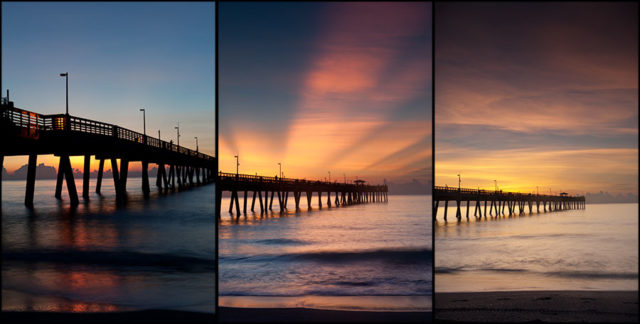In the Face of Changing Conditions
Being able to work efficiently may seem like something only professionals need to be good at, but the truth is far from that. Situations arise in virtually every genera and skill level where being able to quickly adapt and manipulate your camera provide some benefits. Even for those who have no other desire than to take pictures of their kids, being able to easily and intuitively manipulate your camera’s settings will net more and better images.
The need for efficiency, was driven home to me once again recently, when I was shooting a sunrise landscape. Landscape photography, might seem like a it should be far less hectic than say shooting a football game. In practice, however, there’s no faster game changer than Mother Nature. Clouds and lighting can change at an astonishing pace, for example on my recent sunrise shoot the sky went from mundane but nice, to stunning, to stunning in a completely different way all in the course of just 10 minutes.

There are a few things I find that tend to be most helpful to catch the best moments and keep me focused on shooting.
First and foremost, always pay attention to your surroundings, better yet actively look at your surroundings constantly. I can’t begin to count the number of times I’ve watched photographers, especially at popular birding locations, get fixated on one subject only to miss out on a much more dramatic shot 10 feet away. The same can be said about observing the landscape around you, especially what’s behind you. You may not pass back the same way and when you do, the light may not be as good, alternatively there may be an image just waiting for the light to be right.
Second, think about the possible compositions around you. Try to visualize what compositions could be made by moving your camera and how the light will play out in those compositions. Ask yourself, will you get a better image or more dramatic light if you stay where you are, or shoot from the right? Even when you choose not to move, think about how the focus and composition would work if you rotated the camera from horizontal to vertical or vice-versa.
Third, set up as much as possible ahead of times. If you’re not a morning person, but you’re going to shoot a sunrise, can you really rely on yourself to get everything setup correctly in the dark before you’ve really woken up? When I’m doing something like this I’ll take a few minutes the night before to set up my camera. If you expect to shoot a verity of types of shots, take the time to setup a couple of camera user settings if your camera has them.
Forth, insure you’re familiar with your gear. I tell people this a lot, if you practice a little your camera can easily become an extension of your body. When you’re not thinking about what control you have to turn or where to go to change a setting you’re more able to think about what you’re shooting. You should be able to do things like changing lenses quickly and mostly by feel–remember the US Army Ranger saying though, slow is smooth and smooth is fast, work to get the motions right that will make you faster than trying to be a speed demon. The same goes for any of the functions that affect the exposure (aperture, shutter speed, ISO and exposure compensation).
Fifth, try and keep your gear consistent. Consistency with your gear, also helps breed familiarity and shaves precious moments when things are changing. If you use multiple bodies, try and keep them similar in terms of controls. I can’t even count the number of times, I’ve gone searching for how to change a setting on my 40D backup body because I couldn’t remember where it was. When buying lenses, consider that many 3rd party lenses will have controls that turn in different directions to the 1st part ones. This is especially the case for Canon users. While this isn’t something that would stop me from buying a 3rd party lens if it fit my needs, it would be something I’d spend some time practicing to overcome.
Consistency, familiarity and preparation, mean you spend less time being distracted by your camera and more time looking at the world around you and you can’t photograph what you don’t see. Ultimately, the less you have to focus on your camera the more you can look for the great images and experiment with your compositions. A little time and practice with your gear will make your time in the field that much more enjoyable.